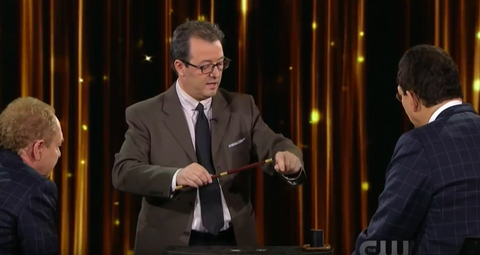
The Power of a Real Magician
If you participate in social media, you probably are aware of the substantial buzz produced by Eric Mead’s appearance on Penn & Teller: Fool Us. Eric performed the late Tim Conover’s handling of the classic John Ramsey effect, The Cylinder and Coins. Knowing that both Penn and Teller were certainly aware of the subterfuge at the heart of this routine, Eric crafted an intriguing presentation based on what Johnny Thompson calls the “90/10 paradox.”
If a magician performs for a layman, and if he can figure out ten percent of how the trick works, but ninety percent of the trick puzzles him, the layman will say that the trick didn't fool him. But if a magician performs for a fellow conjurer, and he can figure out how ninety percent of the trick works but ten percent of the trick puzzles him, he will say he was fooled. Because the Cylinder and Coins is a classic effect, Eric conceded that ninety percent of it wouldn’t fool P&T. He then challenged them to decide if being fooled by the remaining ten percent was good enough to receive the highly coveted FU trophy.
Eric’s ploy worked, and he walked away with the prize. But that gaudy piece of plastic is absolutely not the point of my comments, nor is it the reason magicians got excited by what they saw. Eric’s performance excited everyone because it exemplified everything an audience consciously (or subconsciously) expects a magician to provide: a great effect, a superb handling, an intriguing presentation (expertly delivered), and virtuoso chops.
Eric is, of course, an exceptional talent, one of the best in the world. But even with his gifts, he has still put in the hard work to develop that talent. No matter our position on the spectrum of talented people, it is imperative to hone the abilities we have. So, what can we learn from Eric Mead’s Fool Us performance?

First, pick a strong effect, one that can be clearly understood. The first half of the Cylinder and Coins can be summed up in one sentence: Four coins vanish and appear under a cork inside a cylinder. The second half can be similarly described: The four coins vanish from inside the cylinder and reappear in the hands. Remember, if the spectators can’t follow what’s going on, there will be no magic.
Second, develop the best method you can for the effect. This involves research, experimentation, and personal creativity. Eric’s handling is based on Tim Conover’s method, which is one of the best. But I know Eric has studied this effect for many years. What makes Tim’s method so impressive is that it closely correlates to the “magic ideal.” That is, if you had the power of a real magician, who had the power to make coins vanish and reappear, this is what a Coins and Cylinder routine would look like. The handling is natural. At the end of the routine, all a spectator can say is, “But he didn’t do anything!”
Third, write an interesting script. During the body of the effect, Eric’s patter mainly emphasizes what is going on, and to that extent is not particularly memorable. However, the emotional/intellectual hook he uses at the opening of the routine is exceptional; it provides a motivation for the spectators to pay close attention throughout the routine. His “hook” gives the spectators a reason to care about the outcome of the effect. This is a wonderful example of intelligent scripting. You must have something interesting to say. You must write a script. And you must rehearse that script until it is firmly ingrained and can be delivered clearly and competently.
Also note that a bit of Eric’s personality/character is revealed during that short introductory speech. Establishing that in the brief time period television allows is a difficult task. Eric nailed it.
And this brings us to point number four: practice. There is only one way to achieve the level of expertise demonstrated in Eric’s performance – hours of concerted, thoughtful practice, rehearsal, and flight time. Unfortunately, there is no shortcut; you have to do the work. But, as this performance demonstrates, the result can be glorious.
So, bravo to my old friend Eric; I hope his performance inspires you to work hard. Laymen can appreciate great magic when they see it; the pity is, it too seldom that they have the opportunity to do so. - October 3, 2017, The Great White North
Heading
+29.000 people love our product

Comments
Leave a comment